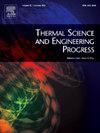利用多目标传热搜索算法对管壳式热交换器进行能源经济分析和优化
IF 5.1
3区 工程技术
Q2 ENERGY & FUELS
引用次数: 0
摘要
本研究介绍了管壳式热交换器的能源经济分析和优化。采用 Kern 方法设计了一种水-水、分段障板管壳式热交换器,并通过执行能源和经济建模进行了分析。分析时考虑了壳侧的设计变量,即挡板切口、挡板间距、壳体直径,以及管侧的变量,即管子布局、管子外径、管子通过次数和管子数量。多目标传热搜索算法用于优化热交换器,以实现最低的总成本和最高的热交换器效率。利用帕累托最优曲线提出了多个最优解。采用 TOPSIS 选择标准来确定最佳运行条件。在给定的变量范围内,管壳式热交换器的最低运行成本为 72,000 美元/年,效率为 16.4%;最高运行效率为 81.6%,总成本为 275,000 美元/年。壳体直径、挡板间距、管子通过数和管子数量在下限和上限之间的分散分布表明,它们在优化热交换器性能方面发挥着重要作用。管子数量和管子通过次数对效率的影响最大,而改变管子布局时,对效率的影响明显较小。本文章由计算机程序翻译,如有差异,请以英文原文为准。
Energy-economic analysis and optimization of a shell and tube heat exchanger using a multi-objective heat transfer search algorithm
This study presents the energy-economic analysis and optimization of a shell and tube heat exchanger. A water-water, segmental baffled shell and tube heat exchanger was designed using the Kern method and analysed by performing energy and economic modelling. The analysis is carried out considering the design variables on the shell side i.e. baffle cut, baffle spacing, shell diameter and tube side variables i.e. tube layout, tube outside diameter, number of tube passes and number of tubes. The multi-objective heat transfer search algorithm was used to optimize the heat exchanger for minimum total cost and maximum heat exchanger efficiency. Multiple optimal solutions were presented using the Pareto optimal curve. TOPSIS selection criteria was used to identify the optimum operating condition. Within the given bounds of the variables, the shell and tube heat exchanger can be operated at a minimum cost of 72,000 $/year resulting in 16.4 % efficiency, or, it can be operated at a maximum efficiency of 81.6 % with a total cost of 275,000 $/year. The scattered distribution of shell diameter, baffle spacing, number of tube passes and number of tubes between the lower and upper bound represent their substantial role in optimizing the heat exchanger performance. The number of tubes and tube passes showed the maximum variation in efficiency, while significantly less impact was observed when the tube layout was altered.
求助全文
通过发布文献求助,成功后即可免费获取论文全文。
去求助
来源期刊

Thermal Science and Engineering Progress
Chemical Engineering-Fluid Flow and Transfer Processes
CiteScore
7.20
自引率
10.40%
发文量
327
审稿时长
41 days
期刊介绍:
Thermal Science and Engineering Progress (TSEP) publishes original, high-quality research articles that span activities ranging from fundamental scientific research and discussion of the more controversial thermodynamic theories, to developments in thermal engineering that are in many instances examples of the way scientists and engineers are addressing the challenges facing a growing population – smart cities and global warming – maximising thermodynamic efficiencies and minimising all heat losses. It is intended that these will be of current relevance and interest to industry, academia and other practitioners. It is evident that many specialised journals in thermal and, to some extent, in fluid disciplines tend to focus on topics that can be classified as fundamental in nature, or are ‘applied’ and near-market. Thermal Science and Engineering Progress will bridge the gap between these two areas, allowing authors to make an easy choice, should they or a journal editor feel that their papers are ‘out of scope’ when considering other journals. The range of topics covered by Thermal Science and Engineering Progress addresses the rapid rate of development being made in thermal transfer processes as they affect traditional fields, and important growth in the topical research areas of aerospace, thermal biological and medical systems, electronics and nano-technologies, renewable energy systems, food production (including agriculture), and the need to minimise man-made thermal impacts on climate change. Review articles on appropriate topics for TSEP are encouraged, although until TSEP is fully established, these will be limited in number. Before submitting such articles, please contact one of the Editors, or a member of the Editorial Advisory Board with an outline of your proposal and your expertise in the area of your review.
 求助内容:
求助内容: 应助结果提醒方式:
应助结果提醒方式:


